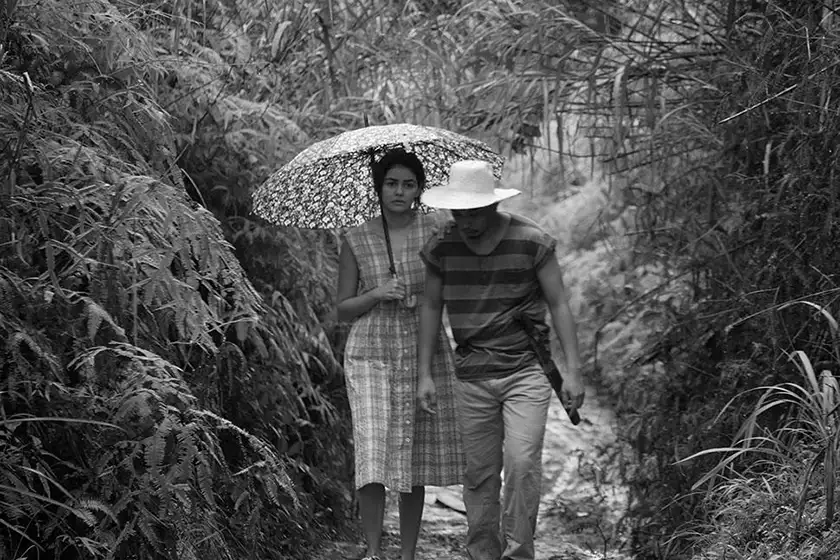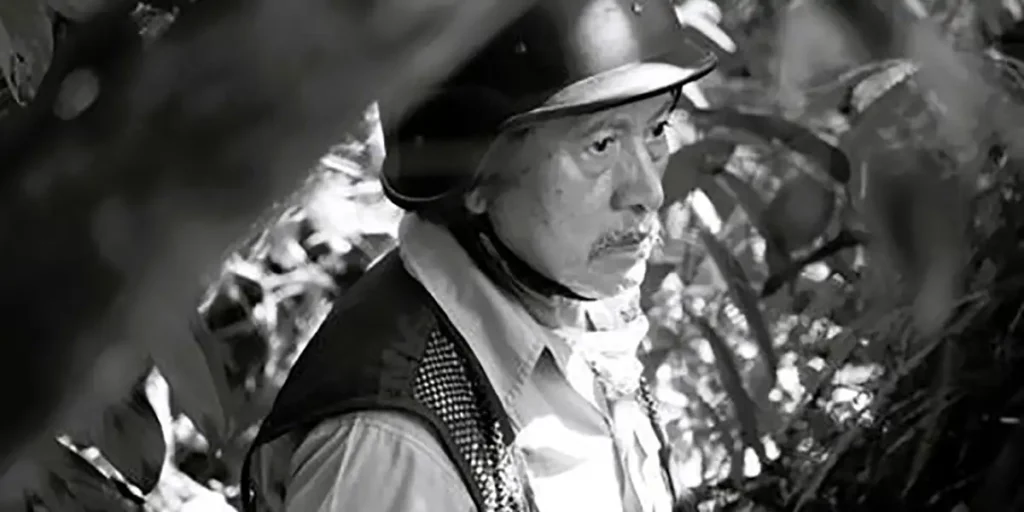Lav Diaz’s Phantosmia hypnotizes the viewer in the first half only to remove them from the experience in the second, by with a weak, laborious structure.
Director: Lav Diaz
Genre: Drama
Run Time: 246′
Venice World Premiere: September 2, 2024
U.S. Release Date: TBA
U.K. Release Date: TBA
Phantosmia, Lav Diaz’s latest film, is one of the many demanding projects by the Filipino independent filmmaker. It is an extensive, visually entrancing journey with a hypnotic effect. The Golden Lion-winning filmmaker returns to the Venice Film Festival – this time, out of competition – with
another exercise that traps the minds, bodies, and souls of those who decided to embark on a four-hour venture into the wistful wilderness.
But as we wander through the scenery, one leisurely shot at a time, the cracks in the structure are more evident. The formula that served him well in the past fails this time around, due to the lack of focus and meaning in the third and fourth hours of this tiring picture.
The film begins with a faraway shot of a riverside, where a character, at this point unknown, recalls as one of the most beautiful views he’s ever encountered. He loves everything about it: the chirping of the birds, the sound of the stream, and the children playing near it. The man calls it a paradise, almost like this country’s garden of Eden, bearing fruit forbidden for outsiders to consume. It may not seem like much. But beauty is in the eye of the beholder; for him, this is the place he tends to go to in his mind, a sanctuary of some sort. This deemed paradise later turns into a land of warfare, as military men take over the place to make sure the civilians who live there move to a safer place.
These are the recollections of a man called Hilarion Zabala (Ronnie Lazaro), a now-retired soldier dealing with an array of situations that hinder his living situation. He has a condition that alters his sense of smell: olfactory hallucinations, also known as phantosmia, which allow him to detect smells that aren’t present in the environment. The root of this disease is not particularly clear at first. However, some clues are revealed through Hilarion’s conversations with many locals and family members. His condition may be related to his past experience in the military. His world has shifted vastly because of this olfactory issue. It feels like he is a man lost in time, going back and forth from the past to the present day just by the whiff of something that causes a remembrance.
There is a remedy for this disease, yet it will cost him plenty. Well, at least emotionally. Hilarion will have to come face to face with literal and metaphorical ghosts of his life as a soldier to get rid of this deep psychological fracture. This now paves the way for Lav Diaz’s four-hour venture into the wild from the past and the more mundane, yet darkly tinted, life of the present day. Structurally and visually, you immediately notice the same rhythm of the Filipino filmmaker’s work. The brooding, slow pacing forces the audience to place themselves into each frame, for which the camera stays on for an extended period of time.

This tests your patience vastly; how Diaz constructs the atmosphere makes each scene feel as if it’s being held hostage by time itself. It moves neither forward nor backward; instead, it remains at a halt. Only Diaz decides when this sensation ends, and we continue to the next chapter in Hilarion’s journey of doldrums and phantom smells. Vignettes fragments the mental state of the lead character and the story’s structure, which does not work in Diaz’s favor. By the time where some, if not most, of the narrative threads must come to a close, there are still too many subplots left unresolved. His recollections diminish Hilarion’s journey. The more he returns to the past, the more Diaz gets lost in his concept. And, coincidentally, the viewer’s mind wanders elsewhere in search of answers… or interest.
Diaz tends to emulate the work of some of his slow cinema contemporaries, like Andrei Tarkovsky and Béla Tarr. He does not possess the sacred, melancholic touch the aforementioned cinema masters have perfected, but he has left his fingerprints on the movement that has inspired plenty of filmmakers. One of the few directors to constantly continue this tradition, Diaz dives into personal stories about his country with a radical approach: the canvas is unlimited, and there are no holds barred. This means that every opinion or thought he has on the times will be present, whether in a positive or negative light. Previously, Lav Diaz used this storytelling method, where he took his time to build an exciting concept from the ground up.
In the case of Phantosmia, the way he implements this technique comes off as more stressful than contemplative. The proclivity to leave the second half of his films without much to hold onto in terms of narrative cohesion hinders the experience. This retracts the viewer from the hypnotic effect that has been curated. Phantosmia‘s bifurcation is haphazard and, even worse, shallow thematically.
His projects are very strenuous. If you search for the definition of the word demanding, his filmography might pop up as a reference. You must be in the right headspace against this lengthy, minimalist beast. I haven’t seen a significant part of his work, as he does a lot of films in a short time, and some of them are hard to find. But, considering the ones I have been able to watch, like 2008’s Melancholia and 2013’s Norte, The End of History, Phantosmia is one of his weaker and less focused efforts.
Phantosmia had its World Premiere at the Venice Film Festival on September 2, 2024. Read our review of Lav Diaz’s Genus Pan!

